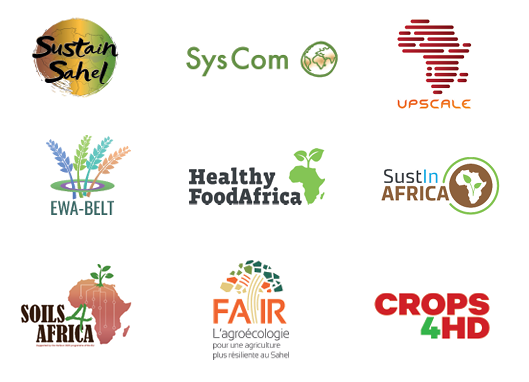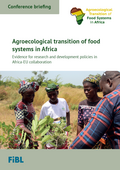Strengthening climate resilience through partnership
As one of the featured projects, SustainSahel contributed its expertise in systematic integration of crops, shrubs, and livestock to discussions on climate-resilient production systems. The conference provided an important platform to showcase how our approach of synergistic natural resource use aligns with broader agroecological goals across the Sahel region.
The event featured keynote addresses from Beate Huber of FiBL Switzerland and Abebe Haile-Gabriel of FAO, who emphasized agroecology's critical role in addressing urgent food system challenges. These strategic insights resonated strongly with SustainSahel's mission to enhance soil quality, build climate resilience, and improve rural livelihoods.
Key Conference themes aligned with SustainSahel goals
Throughout the day, participants engaged in dynamic discussions covering themes directly relevant to our project work:
Climate-Resilient Production Systems: SustainSahel's systematic integration approach demonstrates how combining crops, shrubs, and livestock can build resilience against climate variability in the Sahel.
Agrobiodiversity for Food Security: Our project's focus on diversified farming systems contributes to enhanced nutrition and food security outcomes in participating communities.
Sustainable Livelihoods: The conference highlighted how agroecological transitions can stimulate local economies and create sustainable employment opportunities, echoing SustainSahel's commitment to better rural livelihoods.
Policy impact and future directions
The conference culminated in a policy briefing (linked below) that positions agroecology and organic farming as scalable solutions to climate and food security challenges. This document, compiled by FiBL Europe, calls for greater investment and policy support to scale up agroecological practices across Africa – a recommendation that directly supports SustainSahel's objectives.
The briefing emphasizes agroecology's potential to restore ecosystems, improve productivity, and support inclusive development, principles that are central to SustainSahel's integrated approach to natural resource management.
Collaborative research for greater impact
The conference demonstrated the power of collaborative research, bringing together projects funded by Horizon 2020, the DeSIRA initiative, and the Swiss Agency for Development and Cooperation. SustainSahel's participation alongside projects like EWA-BELT, FairSahel, HealthyFoodAfrica, and others showcases the coordinated effort to advance sustainable agriculture across Africa.
This collaborative spirit reflects SustainSahel's own partnership approach, uniting 17 partners from 9 countries across Europe and Africa under FiBL's coordination.
Resources and next steps
The conference outcomes reinforce the importance of SustainSahel's work in promoting practices that enhance soil quality, build climate resilience, and contribute to food security. As we continue our research and implementation activities, these collaborative exchanges provide valuable insights and strengthen the evidence base for agroecological transitions in the Sahel.
A summary of the conference and inspiring interviews with participants are available in video form on YouTube (linked below).
Links and downloads
- orgprints.org: Conference briefing
- conference.sustainsahel.net: Programme and speakers biographies
- conference.sustainsahel.net: Conference website
- youtube.com: Review video




 tap and then scroll down to the Add to Home Screen command.
tap and then scroll down to the Add to Home Screen command.